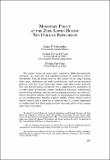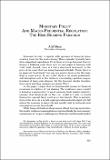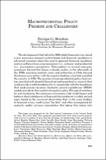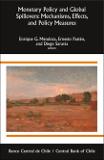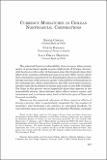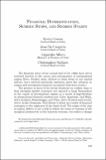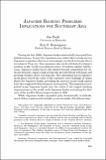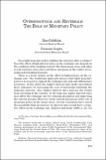Search
Now showing items 41-48 of 48
Monetary policy at the zero lower bound: the Chilean experience
The global financial crisis that started in 2008 dramatically changed the analysis and implementation of monetary policy worldwide. Central banks were at the center of the stage during that time implementing both conventional and unconventional policies. Not only were monetary policy rates drastically ...
Monetary policy and macro-prudential regulation: the risk-sharing paradigm
Economic history is replete with episodes of financial crises creating havoc for the real economy. These episodes typically have three important ingredients. First there are large financial flows to finance a bubbling asset class such as sovereigns or housing with 'safe' debt. Second there is a sharp ...
Macroprudential policy: promise and challenges
The developments that led to the 2008 global financial crisis raised a new awareness amongst central banks and financial regulators in advanced economies about the need to approach financial regulation and surveillance from a macroeconomic (i.e. systemic) and prudential (i.e. pre-emptive) perspective. ...
Monetary policy and global spillovers: mechanisms, effects and policy measures
Central Banks in emerging markets have been forced in the last decade to deal with spillovers from the crises in the United States and Europe and from the extraordinary measures respectively taken by the Federal Reserve and the European Central Bank. This volume provides a comprehensive study of the ...
Currency mismatches in chilean nonfinancial corporations
The potential financial vulnerability that can occur when private sector or government agents acquire high levels of foreign currency debt has been at the center of discussion since the financial crises that affected the countries of Southeast Asia in the late 1990s. To the extent that a mismatch is ...
Financial diversification, sudden stops, and sudden starts
The financial crises of the second half of the 1990s have led to renewed interest in the causes and consequences of international capital flows. Sudden stops, defined as large drops in net capital inflows, have received particular attention, given the collapses in output and investment commonly ...
Japanese banking problems: implications for Southeast Asia
During the late 1980s, Japanese banks substantially increased their global presence. In part the expansion was undertaken to help service Japanese companies that were increasingly involved in foreign direct investment. However, this expansion also can be attibuted to Japan's positio as the world's ...
Overshootings and reversals: the role of monetary policy
Does tight monetary policy stabilize the currency after a collapse?. Does the effect of high interest rates on the exchange rate depend on the condition of the banking system? The East Asian crises and other recent currency crises have put these questions at the center of economic policymaking decisions.

